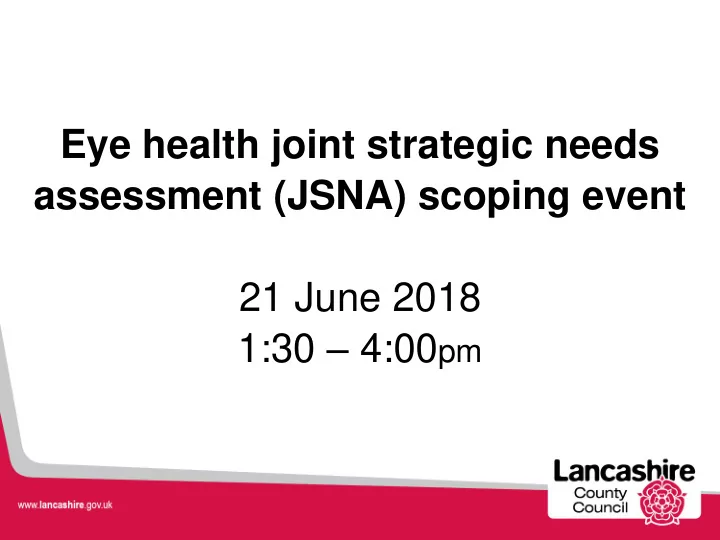

Eye health joint strategic needs assessment (JSNA) scoping event 21 June 2018 1:30 – 4:00 pm
Programme 1:15 – 1:30pm Arrival, sign in and refreshments. 1:30 – 1:40pm Welcome and housekeeping Gemma Jones, JSNA manager, Lancashire County Council 1:40 – 1:45pm An introduction to the JSNA process Gemma Jones Background to the eye health JSNA – why are we doing this? 1:45 -2:00pm Stuart Clayton, CEO, Galloway's Society for the Blind 2:00 -2:15pm Introduction to the workshop: What is the picture in Lancashire and South Cumbria? What questions should we be asking and why? What else do we need? Stuart Clayton and Gemma Jones 2:15 – 3:15pm Workshop for delegates (refreshments will be served). 3:15 – 3:30pm Feedback from the workshops. 3:30 – 3:45pm Any other questions/comments/issues. 3:45 – 4:00pm Next steps: action planning and close of event.
Welcome and introductions Gemma Jones JSNA manager
Background to a JSNA Clinical Local government commissioning groups to ‘have and public regard to the JSNA’ involvement in Health Act 2007 - in commissioning upper tier councils decisions Health Act 2012 – one of the four roles of the health and wellbeing board
The JSNA process Identify working Select topic Scoping Collect data group Identify Review Analyse Interpret priorities literature Write Consultation Publish findings Warm handover recommendations
The Eye Health JSNA in context Stuart Clayton CEO Galloway’s Society for the Blind
Vision Vision UK UK Vision UK is the independent partnership organisation which works with other organisations in the eye health and sight loss sector for the benefit of blind and partially sighted people, their communities and the general population including those at risk of sight loss.
Engl England Visio and Vision n St Strat rategy egy The England Vision Strategy is part of Vision UK’s country-led approach and encompasses the Seeing It My Way outcomes for adults and children. The England Vision Strategy has identified six priorities until 2021 as the key building blocks for change both nationally and locally.
England Vision Strategy Objectives • Prevention: To improve eye health and prevent sight loss across England within diverse groups and the wider population. • Commissioning: To promote effective commissioning strategies across health and social care supporting an integrated and person-centred pathway. • Services: Adults, children, young people and their families have access to the right services, advice and support when eye health and sight loss problems arise.
England Vision Strategy Objectives • Independence: Adults, children and young people can learn, relearn or retain key life skills on a continuing basis as driven by their needs with access to appropriate professional support, aids and adaptations including technology. • Self-determination: To develop and enable face to face and online peer support opportunities and self-help and self-advocacy resources to empower adults, children, young people and their families to achieve their aspirations. • Inclusion: To promote inclusive environments and equality of opportunity to enable blind and partially sighted people to fully participate, contribute and live independently.
What do we already know? In 2011, RNIB asked blind and partially sighted people to tell them about what is important to their own health and wellbeing with the aim to use this feedback as an endorsement to influence real change. A total of 1,182 individuals responded to provide us with the 10 ‘Seeing it my way’ outcomes
Seeing it my Way The 10 outcomes of Seeing it my Way, which are all equal in value, are set out under the following conditions. That I: 1. understand my eye condition and the registration process 2. have someone to talk to 3. can look after myself, my health, my home and my family 4. receive statutory benefits and information and support that I need
Seeing it my Way continued 5. can make the best use of the sight I have 6. can access information making the most of the advantages that technology brings 7. can get out and about 8. have the tools, skills and confidence to communicate 9. have equal access to education and lifelong learning 10.can work and volunteer
Outputs of the JSNA Summary report with recommendations comprising: • Quantitative data analysis • Qualitative data analysis (focus group) Possible service mapping Other supporting documents
Workshop • What is the picture in Lancashire and South Cumbria? • What questions should we be asking and why? • What else do we need/need to know?
Next steps
Contact Businessintelligence.jsna@lancashire.gov.uk 01772 536901 http://www.lancashire.gov.uk/lancashire-insight Follow us on Twitter @lancsinsight
Recommend
More recommend